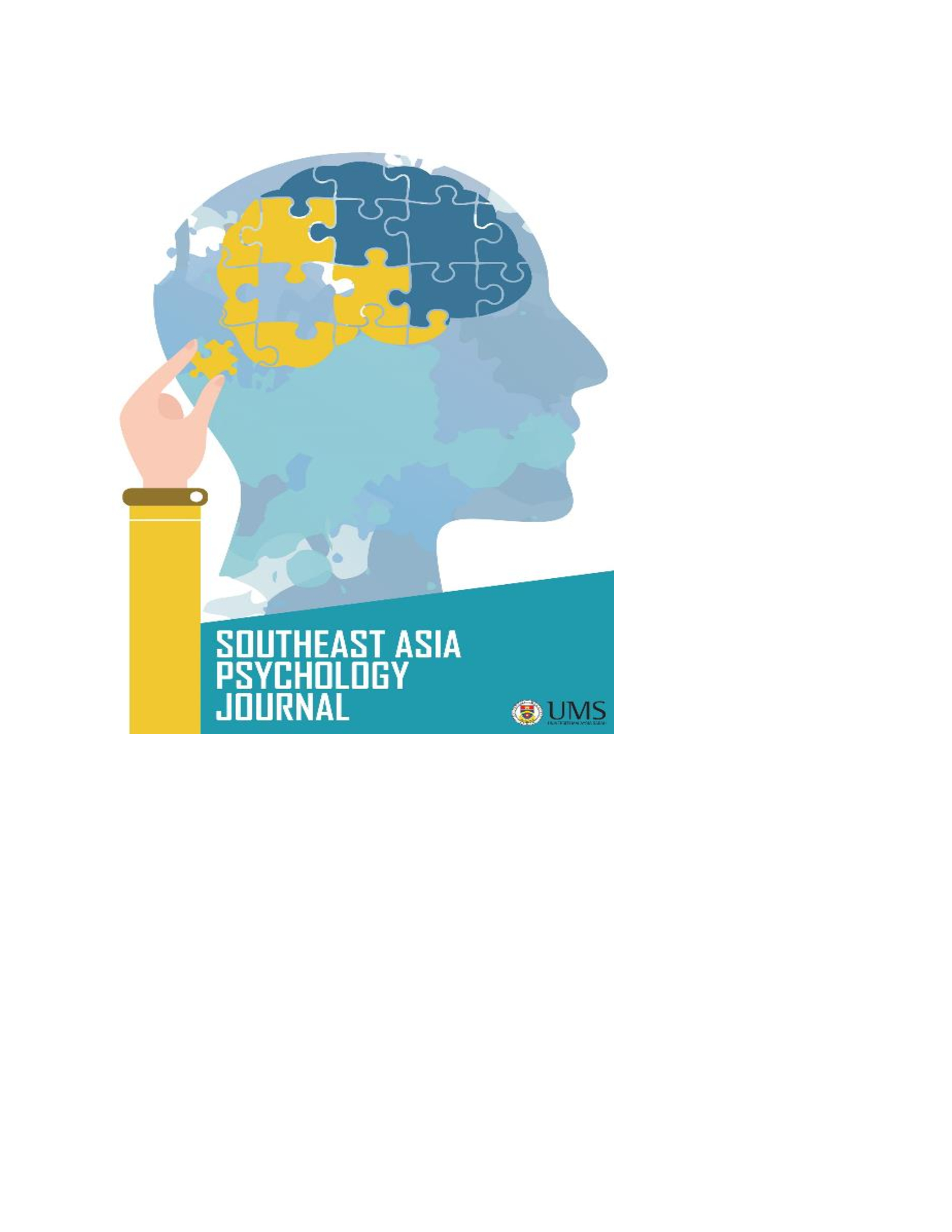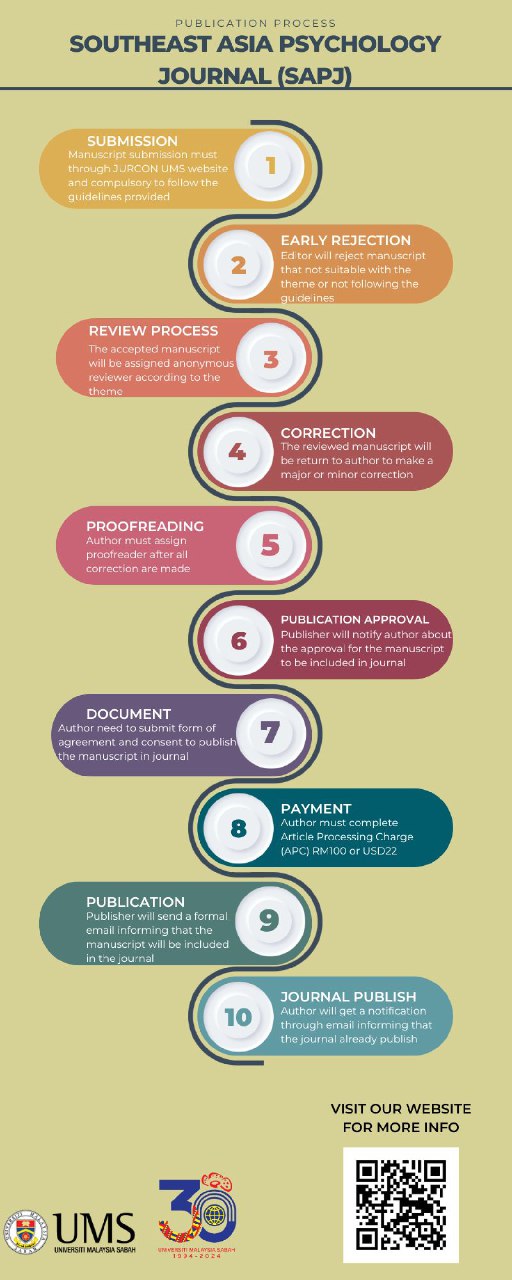Pengaruh Harapan Terhadap Anak dan Sokongan Sosial ke atas Kesejahteraan Subjektif Ibu Bapa Kanak-Kanak Kurang Upaya Pembelajaran
Keywords:
Ibu bapa Kanak-Kanak Kurang Upaya pembelajaran, Kesejahteraan subjektif, Harapan terhadap anak, Sokongan sosialAbstract
Golongan ibu bapa yang mempunyai anak kurang upaya merupakan golongan yang telah dikaitkan dengan pelbagai cabaran dalam membesarkan anak khususnya anak kurang upaya pembelajaran. Kajian lepas mengenai ibu bapa yang membesarkan anak kurang upaya telah menunjukkan betapa kompleksnya cabaran yang dialami oleh ibu bapa termasuklah risiko yang melibatkan aspek kesejahteraan fizikal dan emosi. Walau bagaimanapun, golongan ibu bapa kanak-kanak kurang upaya ini telah memberikan bukti yang berbeza-beza dalam aspek kesihatan mental yang akhirnya menggalakkan lagi penyelidikan yang memberi fokus khususnya kepada aspek-aspek positif termasuklah kesejahteraan subjektif. Mengetahui kesejahteraan subjektif ibu bapa yang membesarkan kanak-kanak kurang upaya merupakan satu keperluan yang sangat penting untuk dipenuhi memandangkan golongan ibu bapa yang membesarkan anak kurang upaya ini adalah sebahagian daripada peratus yang signifikan dalam populasi dunia. Bagi memenuhi dan memahami keperluan tersebut, satu kajian menggunakan Partial Least Squares Structural Equation Modeling (PLS-SEM) dijalankan untuk menguji pengaruh faktor harapan terhadap anak dan sokongan sosial ke atas kesejahteraan subjektif ibu bapa kanak-kanak kurang upaya pembelajaran. Hasil kajian ke atas seramai 328 orang ibu bapa kanak-kanak kurang upaya pembelajaran menunjukkan kedua-dua faktor tersebut memberi pengaruh yang signifikan ke atas kesejahteraan subjektif ibu bapa. Dapatan kajian ini mencadangkan harapan terhadap anak dan sokongan sosial sebagai faktor yang menyumbang kepada peningkatan kesejahteraan subjektif dalam kalangan ibu bapa yang membesarkan kanak-kanak kurang upaya pembelajaran.
References
Anthony, L., Anthony, B., Glanville, D., Naiman, D., Wanders, C. & Shaffer, S. (2005). The relationship between parenting stress, parenting behaviour and preschoolers'social competence and behaviour problems in classroom.Infant and Child Development. 14, 133-154.
Bodla, G. M., Saima, W., & Ammara, T. (2012). Social support and psychological well-being among parents of intellectually challenged children. International Journal of Rehabilitation Science (IJRS), 1(2), 29-35.
Ceballo, R., & McLoyd, V. C. (2002). Social support and parenting in poor, dangerous neighborhoods. Child development, 73(4), 1310-1321.
Cohen, J. (1988). Statistical power analysis for the behavioral sciences (2nd ed.). Hillsdale, NJ: Erlbaum.
Cooke, J. E. (2010). Hope, optimism, stress, and social support in parents of children with intellectual disabilities
Crnic, K., & Low, C. (2002). Everyday stresses and parenting. Handbook of Parenting Volume 5 Practical Issues in Parenting, 242.
Diener, E. (1984). Subjective well-being.Psychol. Bull. 95: 542–575.
Diener, E., & Ryan, K. (2009). Subjective well-being: A general overview.South African Journal of Psychology, 39(4), 391-406.
Diener, E., Oishi, S., & Lucas, R. E. (2002). Personality, culture, and subjective well-being: emotional and cognitive evaluations of life. Annual review of psychology, 54, 403-425.
Diener, E., Sandvik, E., & Pavot, W. (1991). Happiness is the frequency, not the intensity, of positive versus negative affect. Subjective well-being: An interdisciplinary perspective, 21, 119-139.
Diener, Ed, Eunkook M. Suh, Robert E. Lucas and Heidi L. Smith (1999). ‘Subjective WellBeing: Three Decades of Progress.’ Psychological Bulletin, 125 (2), 276-302.
Hartley, S. M., Vance, D. E., Elliott, T. R., Cuckler, J. M., & Berry, J. W. (2008). Hope, self-efficacy, and functional recovery after knee and hip replacement surgery. Rehabilitation Psychology, 53(4), 521.
Horton, T. V., & Wallander, J. L. (2001). Hope and social support as resilience factors against psychological distress of mothers who care for children with chronic physical conditions. Rehabilitation Psychology, 46(4), 382.
Kashdan, T. B., Pelham, W. E., Lang, A. R., Hoza, B., Jacob, R. G., Jennings, J. R., ... & Gnagy, E. M. (2002). Hope and optimism as human strengths in parents of children with externalizing disorders: Stress is in the eye of the beholder. Journal of Social and Clinical Psychology, 21(4), 441-468.
Lyubomirsky, S., King, L., & Diener, E. (2005). The benefits of frequent positive affect: does happiness lead to success?. Psychological bulletin,131(6), 803.
Manuel, J., Naughton, M. J., Balkrishnan, R., Smith, B. P., & Koman, L. A. (2003). Stress and adaptation in mothers of children with cerebral palsy.Journal of Pediatric Psychology, 28(3), 197-201.
Mednick, L., Cogen, F., Henderson, C., Rohrbeck, C. A., Kitessa, D., & Streisand, R. (2007). Hope more, worry less: Hope as a potential resilience factor in mothers of very young children with type 1 diabetes. Children's Healthcare, 36(4), 385-396.
Monsson, Y. (2010). The effects of hope on mental health and chronic sorrow in parents of children with autism spectrum disorder.
Östberg, M., & Hagekull, B. (2000). A structural modeling approach to the understanding of parenting stress. Journal of clinical child psychology, 29(4), 615-625.
Park, N., Peterson, C., & Seligman, M. E. (2004). Strengths of character and well-being. Journal of social and Clinical Psychology, 23(5), 603-619.
Russo, T.J. & Fallou, M.A. (2001). Helping military families who have a child with a disability cope with stress. Early Childhood Education Journal, 29, 3-8. doi:10.1023/A:1011348620920
Seligman, M. E., & Csikszentmihalyi, M. (2000). Special issue: Positive psychology. American Psychologist, 55(1).
Sepa, A., Frodi, A., & Ludvigsson, J. (2004). Psychosocial correlates of parenting stress, lack of support and lack of confidence/security.Scandinavian Journal of Psychology, 45(2), 169-179.
Shenaar-Golan, V. (2015), Hope and subjective well-being among parents of children with special needs. Child & Family Social Work. doi: 10.1111/cfs.12241.
Sipal, R. F., & Sayin, U. (2013). Impact of perceived social support and depression on the parental attitudes of mothers of children who are deaf.Journal of Child and Family Studies, 22(8), 1103-1111.
Smith, T. B., Oliver, M. N., & Innocenti, M. S. (2001). Parenting stress in families of children with disabilities. American journal of orthopsychiatry,71(2), 257.
Snyder, C. R. (Ed.). (2000). Handbook of hope: Theory, measures, and applications. Academic press.




